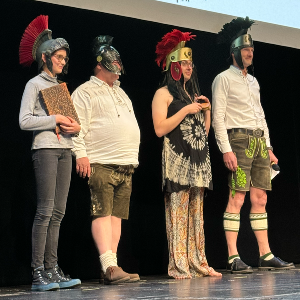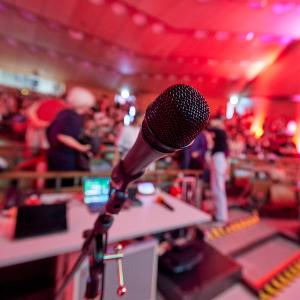Research for all: Why do you slam?
3 Jun 2024
Students and researchers at LMU frequently compete in Science Slams. We explore the appeal of these events and what motivates the participants.
3 Jun 2024
Students and researchers at LMU frequently compete in Science Slams. We explore the appeal of these events and what motivates the participants.
Science is fun. Formats in which researchers present their work in a relaxed, entertaining fashion are very popular. People from LMU are regular participants in Science Slams of all kinds. Certainly, enjoyment is a motivating factor they all share. But beyond that, there are many other reasons to take part.
Tumultuous applause rains down on Maren Rothkegel after her performance at the Science Slam run by the Munich University Association. The medical student wowed the audience with her self-penned rap. The lecture hall at the Walther Straub Institute is bursting at the seams again for this year’s slam. The participants compete in three categories: TED Talk, Poetry Slam, and Freestyle. As such, there are presentations, poetry, and fluid singing – about everything from dubious banking transactions to black holes to invisible supply chains. The acclaim for each contribution is measured with a decibel meter – the slammers that receive the loudest applause win.
Like Maren Rothkegel, who wins the Freestyle category. Accompanied by the beats of her own music, she raps about a disease that is widespread yet little understood: endometriosis. “Many people are completely unaware of this disease, even though they themselves might be affected by it,” she explains. “People who go to their doctor with typical symptoms are often told it’s just normal for a person with a uterus.”
190 million people around the world, with a uterus and with this hurt / With no help and no diagnosis: Until ten years later, they’re told: endometriosis!Maren Rothkegel
Maren Rothkegel wants to shed light on this inequality in medicine and raise awareness of the issue. Although medical curricula now cover endometriosis, there is still much catching up to do. “There needs to be more information and awareness out there so that the disease is not recognized too late. Otherwise, in the worst case, it can lead to infertility.” Inequalities in research and medicine are widespread, especially when it concerns marginalized groups.
Furthermore, Maren sees an urgent need to make complex subjects understandable to ordinary people and to lower language barriers. Before studying medicine, she trained to become a nurse and practiced nursing. This non-academic perspective showed her how often communication problems arise between doctors and patients: “In the hospital, I often notice that patients don’t exactly understand what’s being said to them.” There is little time for explanations and the medical terminology is difficult to comprehend. And this does not just apply to medicine, but also to the technical language of research.
Science communication does not have to be difficult to understand and full of academic jargon, but can take the form of a rap, a slam, or a dance.Maren Rothkegel
A science slam is a wonderful opportunity to break through this wall, according to Maren: “Science communication does not have to be difficult to understand and full of academic jargon, but can take the form of a rap, a slam, or a dance.” An event like this also provides an opportunity to hear perspectives from outside the world of medicine and talk to students of law, physics, and many other disciplines.

Verónica Errasti Díez has already got people excited about science in a bar at the “Pint of Science”. | © Alice M. Smith-Gicklhorn
Dr. Verónica Errasti Díez is deeply passionate about fundamental physics. “My goal is to make people feel ridiculously small and ridiculously large, to expand their understanding of reality and recognize that we live in a fascinating universe.” She is certain that the general public can be interested in the topics she works on every day: “I try to probe the universe in the places we currently cannot investigate with experiments. Just because you can’t observe something shouldn’t arrest your curiosity, but make it sharper.” She wants to convince her audience of the truth of this maxim.
To this end, she has chosen an unusual stage: At the start of July, Errasti Díez, member of the ORIGINS Excellence Cluster, will be one of twelve researchers appearing at the Munich version of the global Soapbox Science 2024 initiative. “We’ll be a dozen female participants covering a wide spectrum of topics – from dinosaurs to robots,” says the LMU physicist.
My goal is to make people feel ridiculously small and ridiculously large, to expand their understanding of reality and recognize that we live in a fascinating universe.Verónica Errasti Díez
In Soapbox Science, the experts will not be addressing an invited audience, but standing in the midst of ordinary passersby on the famous Rindermarkt in Munich – people who are going shopping, perhaps, or heading to a beer garden, but not likely to be thinking about women in science. “But then they see us – a group of women in lab coats – and they cannot help looking over,” explains Errasti Díez. “At other events, I mainly address people who are already interested in science and are well informed. With this format, we can reach an untypical audience that is not expecting the encounter.”
The stated goal of Errasti Díez and her fellow campaigners is to inspire young girls and women to be interested in science and research, particularly in STEM subjects. Errasti Díez points out that girls find it easier to identify with real people than with an abstract picture. “Girls benefit from seeing female researchers,” she says. When they do, they’re able to imagine at a much earlier age pursuing such a career themselves, “as numerous studies have shown.”
Girls benefit from seeing female researchers, as numerous studies have shown.Verónica Errasti Díez
Soapbox Science facilitates precisely such encounters. The random passersby can explore various scientific fields and talk to the researchers. Verónica Errasti Díez sees the benefits for the scientists as well: “You truly understand something only when you can explain it. To do this, you have to zoom out of your everyday ways of looking.” It is a prime opportunity to reflect deeply, she observes. Moreover, people ask questions that would have never occurred to her, because they are not aware of the limits and fixed schemata of the subjects. “This often sparks connections that would have never happened while talking to my colleagues.”
So that the exchanges with pedestrians are productive and likely to inspire girls, Errasti Díez and the other participants will receive special preparation for the event. “Researchers are naturally enthusiastic about their own work and want to share this passion, but they often lack the required communication know-how,” explains Errasti Díez. As well as receiving comprehensive guidelines, the participants will meet up with the organizers before the event for a joint training session.
So many impressive women of different nationalities, at different stages of their scientific careers, talking about their diverse research fields.Verónica Errasti Díez
This will allow the experts to become acquainted among themselves and help each other develop the best strategies for an entertaining presentation. Verónica Errasti Díez is enthusiastic: “So many impressive women of different nationalities, at different stages of their scientific careers, talking about their diverse research fields.” With this variety, she notes, it is impossible that they would all fit the stereotypes that young girls might have in their minds regarding women in science and technology.

Muscle-packed warriors or musical comedians? Who were the Spartans really? | © science-slam.com
PD Dr. Denise Reitzenstein is another LMU researcher who wants to challenge gender stereotypes – those of ancient Sparta. The most recent Science Slam in which the senior lecturer in ancient history took part was held at the Münchener Kammerspiele theater. “A wonderful venue for a performance, especially in front of a full house!” they recall (Reitzenstein is nonbinary and goes by “they/them” pronouns).
During the pandemic, Reitzenstein organized a hybrid History Slam for German Historians’ Day. This gave them the idea of slamming about their own research topics. “At the beginning, I had reservations. After all, the format tends to be the preserve of younger people like students and doctoral candidates. But then I thought: What the heck!” In a performance last year at Berlin’s Pergamon Museum, Reitzenstein captivated the audience with tales from the history of ancient Greece, which they delivered in front of the imposing Ishtar Gate from Babylon.
Denise Reitzenstein likes to take apart our gender conceptions about the ancient Spartans. “In my research, I started studying reception history, especially that of ancient Sparta.” According to Reitzenstein, our notions of the Spartan as a hypermasculine race of warriors is more than doubtful. Even ancient sources were mostly saturated with the ideology and propaganda of Sparta’s archenemy, Athens, such that the history of Sparta is reception history from the beginning. “Imagine Putin was to write a history book on Ukraine – we wouldn’t expect an objective account.” And so it continued over the course of history: “Every era cobbles together its own image of Sparta,” explains Reitzenstein. “We always build the Sparta that suits the needs of the present day.”
Every era cobbles together its own image of Sparta. We always build the Sparta that suits the needs of the present day.Denise Reitzenstein
During the Nazi era, a workbook circulated in German schools with the title Sparta. The Life Struggle of an Aryan Master Race. “This illustrates how ancient topics were and are misused in the pursuit of ideological and propagandistic goals.” The image of the muscle-bound Spartan freedom fighter has survived to this day, notably in the blockbuster movie 300, which was based on a comic-book series and was chock-full of martial arts sequences. In their slam performances, Reitzenstein puts forth the counter-image: Sparta as the inventor of free love, for instance. That aspect of Spartan life is there in the sources as well, if one cares to find it. Also, that the Spartans were a humorous people who were fond of music and pithy jokes.
Denise Reitzenstein steps into the spotlight and addresses hundreds of people about the ancient world and false historical conceptions. However, they do not see themself as born for the limelight. “That’s not the way I was raised at all,” they say. “I was brought up to stand in the background and not be too loud.” They had to pluck up a lot of courage before stepping out on stage for the first time. But it was worth it: “Grasping the nettle was liberating.” Reitzenstein wants to make their audience question their own conceptions of history. “Our understanding of history should be based on critical examination of the sources, not on hazy received notions; on what can be actually ascertained historically and is not mere fantasy.”
The topics of my research lie two-and-a-half thousand years in the past. At these events, I can show why it’s still worthwhile for politics and society to support such historical inquiry.Denise Reitzenstein
However, there is another reason why they want to communicate their research to the general public. “When I move outside my academic bubble, I always think it’s important to explain what I do.” Because their research is funded by public money, they feel the need to convey to people what is exciting and relevant about their work. “If somebody develops novel fuels or improves heart surgery in their work, the social benefits are obvious. The topics I deal with in my research lie two-and-a-half thousand years in the past. At these events, I can show why it’s still worthwhile for politics and society to support such historical inquiry.”

Who dares to present their own doctoral topic in just three minutes? | © LMU / Stephan Höck
For people who like their stories snappy, the GC Speed Slam is just the ticket. Hosted by the GraduateCenterLMU, the event will take place on 5 June. All the participants are currently doing a doctorate at LMU. They have just 180 seconds to present their research and captivate the audience. The contestants come chiefly from the life sciences: veterinary medicine, human medicine, neuroscience, and biology. “We’ll be taken on the search for the deadly potential of carrots, for example, and will gain insights into space medicine,” says Florian Kniffka, organizer of the slam.
“While doing my own doctorate, I learned how important it is to have a little set of explanatory models at hand to answer the question What’s your thesis actually about? so that you can describe your work in a brief form that people will understand,” explains Florian Kniffka. “We thought that a Science Slam would be an ideal way of helping PhD candidates develop these skills.” After all, they are called on to explain what they do not only by family and friends, but also by strangers at conferences, congresses, and trade shows.
Contestants should tell a gripping story in a short amount of time to get listeners hooked and pique their curiosity for their work.Florian Kniffka
“In the world of science, there are always moments when it’s crucial to present yourself convincingly and convey to others why your work is fascinating and important,” explains Kniffka. At the GC Speed Slam, the participants have to do this without any aids except for a single presentation slide. Props, funny costumes, and music are not allowed. “It’s easy to rely on digital tools, but you also need to be able to express yourself clearly without them,” says Kniffka. “Let’s say I’m at an ice cream parlor and I bump into the professor with whom I want to apply for a position. She says: Tell me quickly what it’s about! – then I should be ready for that moment.”
As preparation, the Graduate Center is holding small group meetings where the doctoral candidates can become acquainted and give each other feedback. According to Florian Kniffka, the communication training not only strengthens the slammers in their role as researchers within their specialist fields, but also as regards their responsibility as experts in society. “In the current climate, we can see how important it is to communicate science, as it is often closely related to political decisions.” This has become very apparent during the coronavirus pandemic and in relation to other societal issues. Even if every individual is not directly involved, it is still vital that the general public is able to evaluate and relay the scientific information created by researchers. “As such, I believe that individual researchers play a valuable role in society when it comes to disseminating and amplifying scientific information.”